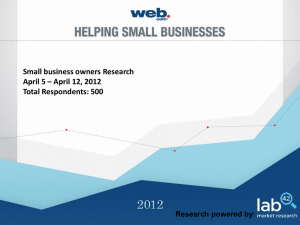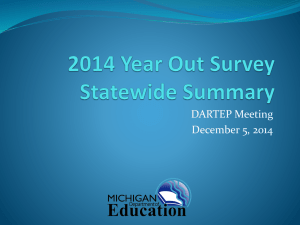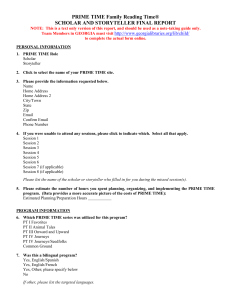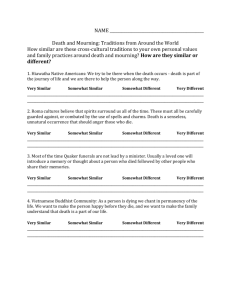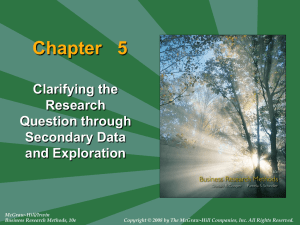ACRL Academic Library Trends and Statistics Survey
advertisement
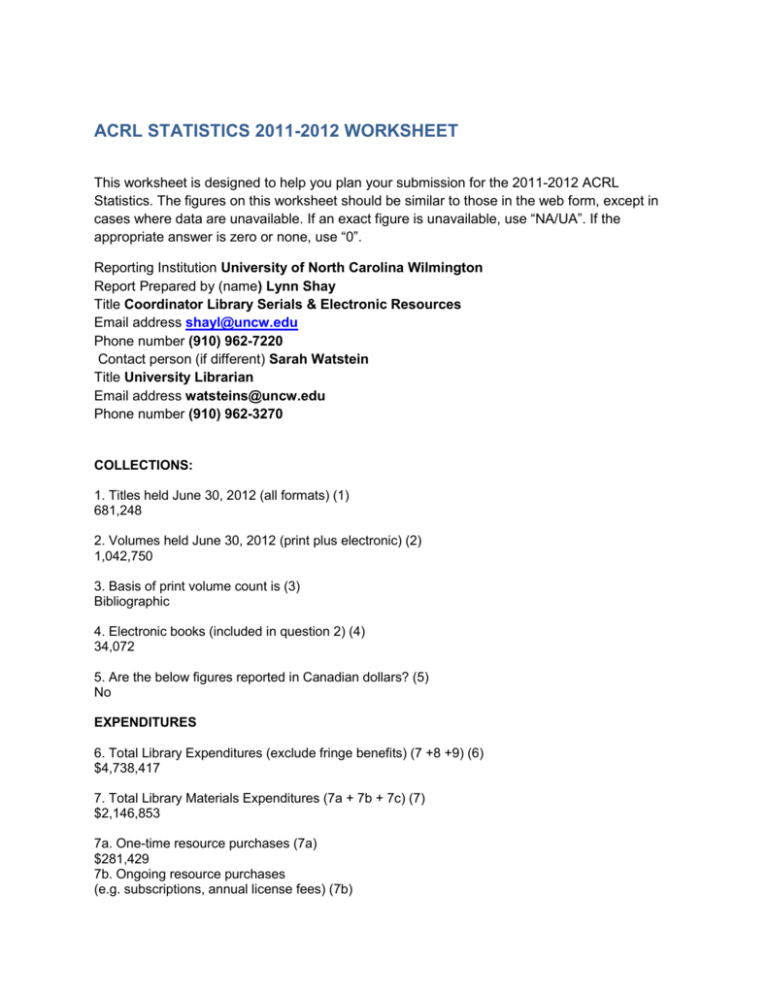
ACRL STATISTICS 2011-2012 WORKSHEET This worksheet is designed to help you plan your submission for the 2011-2012 ACRL Statistics. The figures on this worksheet should be similar to those in the web form, except in cases where data are unavailable. If an exact figure is unavailable, use “NA/UA”. If the appropriate answer is zero or none, use “0”. Reporting Institution University of North Carolina Wilmington Report Prepared by (name) Lynn Shay Title Coordinator Library Serials & Electronic Resources Email address shayl@uncw.edu Phone number (910) 962-7220 Contact person (if different) Sarah Watstein Title University Librarian Email address watsteins@uncw.edu Phone number (910) 962-3270 COLLECTIONS: 1. Titles held June 30, 2012 (all formats) (1) 681,248 2. Volumes held June 30, 2012 (print plus electronic) (2) 1,042,750 3. Basis of print volume count is (3) Bibliographic 4. Electronic books (included in question 2) (4) 34,072 5. Are the below figures reported in Canadian dollars? (5) No EXPENDITURES 6. Total Library Expenditures (exclude fringe benefits) (7 +8 +9) (6) $4,738,417 7. Total Library Materials Expenditures (7a + 7b + 7c) (7) $2,146,853 7a. One-time resource purchases (7a) $281,429 7b. Ongoing resource purchases (e.g. subscriptions, annual license fees) (7b) $1,782,869 7c. Collection support (7c) $82,555 8. Total Salaries and Wages (8a + 8b + 8c) (Exclude fringe benefits; Report fringe benefits in question 10) (8) $2,119,507 8a. Professional staff (exclude fringe benefits) (8a) $1,090,931 8b. Support staff (exclude fringe benefits) (8b) $958,536 8c. Student assistants (exclude fringe benefits) (8c) $70,040 9. Other operating expenditures (9) $472,057 FRINGE BENEFITS Provide a detailed footnote on what this includes) 10. Fringe benefits (10) $602,032 11. Official designated percent (11) 14.23% EXPENDITURES FROM EXTERNAL SOURCES 12. Consortia/Networks/Bibliographic Utilities Expenditures from External Sources (12) -1 PERSONNEL (Round figures to nearest whole number) 13. Total Staff FTE (13a + 13b + 13c) (13) 49.40 13a. Professional staff, FTE (13a) 21.00 13b. Support staff, FTE (13b) 24.45 13c. Student assistants, FTE (13c) 3.95 INSTRUCTION 14. Number of library presentations to groups (14) 448 14a. Is the library presentations figure based on sampling? (14a) No Yes No No 15. Number of total participants in group presentations reported in line 14 (15) 11,135 15a. Is the total participants in group presentations figure based on sampling? (15a) Yes REFERENCE No No No 16. Number of reference transactions (16) No 14,692 16a. Is the reference transactions figure based on sampling? (16a) No CIRCULATION 17. Number of initial circulations (excluding reserves) (17) 223,140 USE OF ELECTRONIC RESOURCES (following COUNTER definitions) 18. 19. 20. Number of successful full-text article requests (journals) (18) 298,181 Number of regular searches (databases) (19) 1,961,598 Number of federated searches (databases) INTERLIBRARY LOANS 21. 22. Total number of filled requests provided to other libraries (21) 6,890 Total number of filled requests received from other libraries or providers (22) 5,946 DOCTOR’S DEGREES AND FACULTY 23. 24. 25. Number of Doctor's Degrees awarded in FY2011-2012 (23) 15 Number of fields in which Doctor's Degrees can be awarded (24) 2 Number of full-time instructional faculty in FY2011-2012 (25)628 ENROLLMENT – FALL 2011 26. 27. 28. 29. Full-time students, undergraduate and graduate (26) 11,336 Part-time students, undergraduate and graduate (27) 1,809 Full-time graduate students (28) 488 Part-time graduate students (20) 754 FOOTNOTES NOTE: Any large shifts in reported data compared to last year should be explained with a footnote. Submit the completed questionnaire By May 31, 2013 For assistance, please e-mail Counting Opinions via Lindsay Thompson (acrlsupport@countingopinions.com) Tel. (800) 542-9847 2012 ACRL Trends Questions In October 2011 the ACRL Board approved a revision of the ACRL Standards for Libraries in Higher Education. The following four questions are meant to gauge its usefulness at this time. 1. Are you aware of the 2011 revision of this document? Yes 2. If you are aware of these Standards but have not used them, please share your reasons. (Check all that apply) None apply Desire quantitative guidelines Have an assessment plan in place Have not used yet, but plan to in the future No campus support for use of library standards Too many procedural/implementation questions about the Standards Use regional accreditation standards instead 3. If you have used the document, please specify the use. (Please check all that apply). For each one checked, indicate level of usefulness: Very useful / Somewhat useful / Not at all useful Yes To justify library budget Very useful / Somewhat useful / Not at all useful Yes To justify staff maintenance or expansion Very useful / Somewhat useful / Not at all useful Yes To justify collection upgrade Very useful / Somewhat useful / Not at all useful Yes To justify improvement of services in general Very useful / Somewhat useful / Not at all useful Yes To set or measure benchmarks for library improvement Very useful / Somewhat useful / Not at all useful Yes To prepare accreditation reports Very useful / Somewhat useful / Not at all useful Yes To engage in library self-study Very useful / Somewhat useful / Not at all useful Yes As a guide for strategic planning Very useful / Somewhat useful / Not at all useful Yes To assess the library’s performance Very useful / Somewhat useful / Not at all useful Yes To orient/educate college administration Very useful / Somewhat useful / Not at all useful Yes To facilitate conversations about the library Very useful / Somewhat useful / Not at all useful Other (please describe how you used the document, and whether you found it useful for that purpose) 4. Please rate the overall usefulness of the Standards for your purposes: Very useful Somewhat useful Not useful at all 5. Does your library use social media? Yes 6. If yes, what social media does your library use? (Select all that apply) Blogs/microblogs Delicious or similar social bookmarks Facebook Flickr IM Pinterest Podcasts Reading lists/saving articles such as Mendeley RSS Twitter Wikis Yes Other, please specify - tumblr 7. If yes, for what purposes? (Select all that apply) Book clubs or similar activities Communication of problems such as downtime for the catalog, databases, etc. Community building Friends of the Library Learn more about your users Marketing of events Promotion of library services Respond to feedback, suggestions, complaints Other, please specify Volumes held (as of June 30 reporting year) 2. Volumes counted: monographs, bound journals, electronic journals not in packages, government documents, ebooks, electronic theses and dissertations. 2. ebooks products and number of titles: Product - Titles Wiley Interscience 67 R2 Library 110 Oxford Reference 11 SAGE eReference 213 CQ Press 32 ScienceDirect 12 Gale Virtual Reference Library 51 EBSCO ebooks 33,335 Learning Express 480 ABC Clio 385 MyiLibrary 378--2013-05-31 Official designated percent 11. Percentage reported does not include FICA or health insurance. The percentage reported is for professionals that choose the State Retirement plan; the percent is different for professionals that choose the Optional Retirement Plan.--2013-05-31 Number of successful full-text article requests 18. Full text article requests reported came from full text databases, full text online journal subscriptions and from full text online journal packages.--2013-05-31 Number of regular searches (databases) 19. Regular searches were counted from index & abstract databases, full text databases, full text online journal subscriptions, full text online journal packages, online encyclopedias/dictionaries and ebooks.--2013-05-31 Number of federated searches (databases) 20. No counter statistics for federated searches.--2013-05-31 Number of Doctor's Degrees awarded in the fiscal year 23. 3- PhDs in Marine Biology and 12- Ed.D in School Administration.--2013-05-31 Number of full-time instructional faculty 25. For FY2010-2011 the number of full-time instructional faculty reported was incorrectly reported as 1,057 - actual number was 602.--2013-05-31
